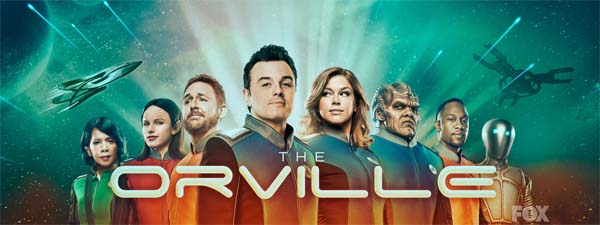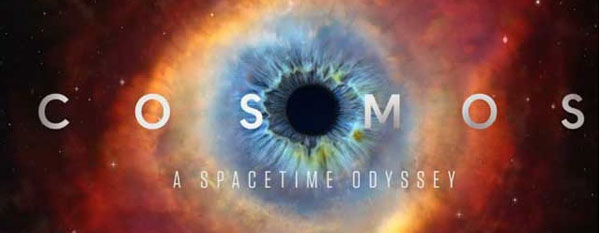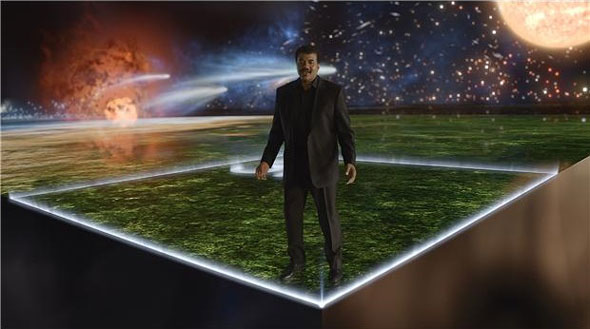
Discovery isn't the only Star Trek show on TV this fall -- at least, in spirit anyway. September saw the premiere of Seth McFarlane's Trek-clone The Orville. Orville stumbled out of the gates at first with a premiere episode that I really didn't like. But it's been slowly getting better -- or at least, less bad, with each of the first few episodes being substantially better (though still not entirely effective) than the premiere.
A lot of this has to do with a shift in the show's tone. The show was advertised and marketed as a comedy (basically, a televised version of Galaxy Quest), and I went into the first episode with a comedic mindset, and that premiere episode definitely went out of its way to try to tell jokes. That was a problem because the jokes (and by extension the show) just wasn't funny. The focus on comedy and gags also detracted from the serious drama, which was poorly-written, sloppily-executed, and which revolved around a dumb sci-fi MacGuffin. Further, much of the comedy involved stupid pop culture references which are going to quickly become dated; thus, hurting the show's lasting re-watchability if it ever becomes good enough to warrant rewatching.
If you think Star Trek needs more dick and fart jokes --
or more dogs licking their balls in the background, then The Orville is for you.
The problem is that MacFarlane just isn't that good at writing jokes. It pains me to say this because I was a huge fan of Family Guy when it first premiered, and I'll still defend the quality of those first two seasons. But MacFarlane seems to be completely arrogant in his own joke-writing ability, while simultaneously completely dismissive of the audience's ability to grasp the jokes that he seems to think are much more complex and clever than they actually are. Most of these jokes boil down to being fart or sex jokes, and very few work on more than the most juvenile and immature of levels. Perhaps the best example of this is a joke in which the Captain Mercer puts a distress call on the viewscreen. The distressed scientist has a dog in the background who spends the entire conversation licking his balls. It was mildly funny due to its relative subtlety. Yeah, I guess that probably happened occasionally to Captain Archer in Enterprise. Ha ha. But then as soon as the conversation was over, the viewscreen flicks off, and the navigator and helmsman say "Hey, did you see that dog licking his balls?" What little subtlety is gone; joke ruined!
It's like McFarlane thinks he has to remind the audience that there was a joke, and that you should have been laughing, even though the joke wasn't that funny to begin with. This is the same problem that I've always had with laugh tracks in sitcoms: all they do is remind me that the jokes aren't funny. Except McFarlane doesn't use a laugh track, he writes the "hey, there was a joke here. Did you get the joke?" into the script!
"Command Performance" had humor more appropriate for its sci-fi set-up and relationship drama.
The next two episodes, however, seemed to plant their feet more firmly in the territory of genuine sci-fi concepts and character drama, and the show was stronger for it. The execution, however, is kind of hit-or-miss...
[More]
70d52091-ba33-4edf-9546-e800ddef74cf|1|1.0
Tags:the Orville, Seth MacFarlane, science fiction, comedy, Union, Moclan, Galaxy Quest, Star Trek, space, exploration, politics, religion, women, gender, gender equality, transgender, equality, futurism, progressive, allegory, straw man, fallacy

Last night, the first episode of the reboot/sequel to Carl Sagan's acclaimed series Cosmos premiered on FOX and National Geographic Channel. I'd been anticipating this show since it was announced last year, as the original Cosmos is one of the best educational programs that has ever been produced. This show is hosted by Neil deGrasse Tyson, whose passion and charisma makes him an excellent communicator of scientific ideas (right up there with Bill Nye) and fitting successor to Sagan.

The new "cosmic calendar".
In this premiere episode, Tyson gives a brief tour of the solar system, recounts the story of Giordano Bruno, and introduces the viewer to Sagan's classic "cosmic calendar". The information presented in this episode is very high-level. I'm hoping that this is due to the introductory nature of this first episode, and that the remaining episodes will go into much greater depth and detail. However, I fear that the one-hour format will be too constraining for Tyson to provide any information of substance. Sagan's original series was made up of thirteen episodes each two hours long, and that format gave him the opportunity give more than just an introduction to a given topic, providing specific details on the evidences and experiments that lead to the discoveries he presented. Will Tyson have the time in later episodes to provide more information than one can get from the first paragraph of a Wikipedia article? I hope so.
[More]
4d50d3bd-9028-4211-b776-131a32288f81|0|.0
Tags:Cosmos: A Spacetime Odyssey, cosmos, Neil deGrasse Tyson, Cosmos: A Personal Voyage, Carl Sagan, science, exploration, history, imagination, ship of the imagination, cosmic calendar, big bang, FOX, National Geographic, Ann Druyan, Seth MacFarlane, Brannon Braga